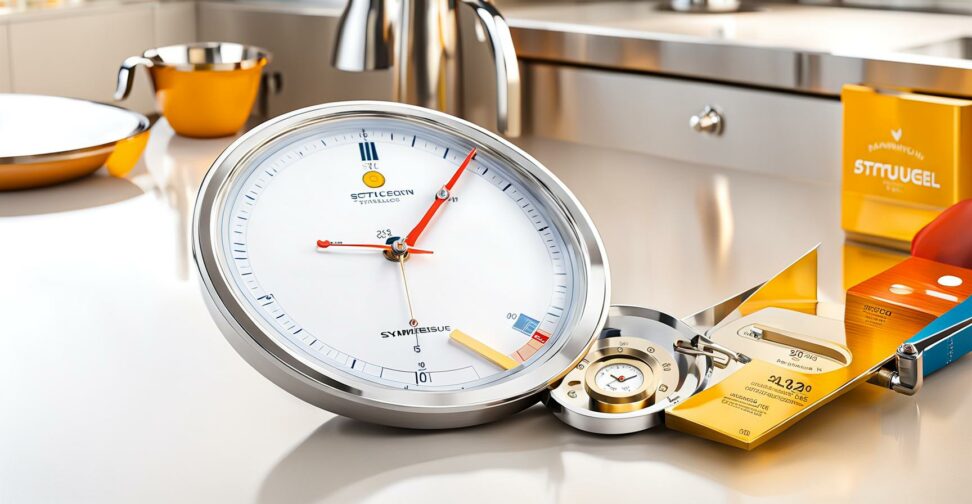Choose the Best Stainless Steel Gauge for Maximum Sink Durability
Choosing a new kitchen sink brings up many decisions - double bowl or single, undermount or drop-in, porcelain or stainless steel. One key factor that is often overlooked by homeowners is sink gauge - the thickness of the stainless steel material.
Going with the right gauge for your lifestyle and needs is crucial to getting a durable sink that truly lasts. Read on to learn everything you need to know about choosing the best stainless steel gauge for maximum durability and avoiding dents, damage, and disappointment down the road.

How Sink Gauge Impacts Durability
What is Gauge?
Gauge refers to the measurement of how thick steel is. It is typically used for sinks, appliances, and metal industrial applications.
The lower the gauge number, the thicker the steel will be. Most stainless steel sinks range from 16 gauge to 20 gauge:
- 16 gauge - thickest option, most durable
- 18 gauge - provides good durability and strength
- 20 gauge - more budget-friendly but still decently thick
Why Gauge Matters
A thicker, lower gauge sink is naturally able to withstand more wear and tear without becoming dented or misshapen over time. Sinks made from thinner steel are more prone to showing scratches, developing dings from dropped pots and pans, or even warping and losing their shape with heavy use.
Opting for a more rugged 16-18 gauge sink rather than a 20 gauge version will ensure your sink maintains its original form and smooth, dent-free finish for years of heavy use. The extra thickness also helps resist noise and offers a more substantial feel.
Other Factors that Impact Durability
While gauge is important, it is not the only factor that affects performance and durability:
- Design - square corners can dent more easily than smooth, rounded corners
- Grade of stainless steel - higher grades like 304 and 316 are more resistant to corrosion
- Coatings - enamel or stone coatings can help limit scratches
- Soundproofing - pads and undercoating reduce noise and vibrations
Choosing the Right Gauge for Your Needs
Consider Usage and Lifestyle
How you plan to use your sink should dictate what gauge you choose. Home chefs who frequently handle heavy cast iron or stainless steel pots and pans should aim for a rugged 16 or 18 gauge sink.
For moderate usage, an 18 or 20 gauge sink will suffice for most households. Prioritize thickness if your kitchen sees a lot of traffic and heavy use.
Factor in Costs
As you may expect, thicker gauge stainless steel sinks come with a higher price tag. You'll have to determine if the added investment is worthwhile for you to gain the benefits of extended durability and fewer dents or repairs down the road.
Consider your budget and whether you can find any sales or negotiate on pricing for pricier pro-grade sinks. There are ways to get excellent deals if you search thoroughly and have some flexibility.
Noise Reduction
Thicker stainless sinks tend to make less noise than their thinner counterparts. The denser steel helps deaden vibrations and clanging. Undercoating spray on the underside of the sink also helps reduce noise.
If your current stainless sink makes your ears ring every time you wash dishes, upgrading to a heavier gauge model can provide a reprieve.
Standard vs. Custom Sizes
If opting for an uncommon custom or non-standard sized stainless sink, you will likely want to go thicker on gauge. Manufacturers often recommend at least 18 gauge for a durable custom sink, especially for larger sizes.
Be sure to consult with the manufacturer first about minimum gauge recommendations before purchasing a non-standard sink.
Key Differences Between Sink Materials
While stainless steel is highly regarded for its durability, it is not the only material available. Here is how it compares to other common options:
Porcelain Enamel
Porcelain enamel sinks have a glasslike coated surface that can chip and scratch over time. Any scratches are highly visible and prone to staining and buildup. Porcelain is also not as hygienic as stainless steel.
Solid Surface Composite
Solid surface sinks like quartz hold up well to minor scratches but can be etched by acidic foods. They need regular sealing to remain hygienic. While durable, they ultimately cannot withstand heavy use as well as stainless steel.
Stainless Steel
Stainless steel reigns supreme in terms of durability. It is easy to keep clean, resists stains, rust, and corrosion, and available in a range of thicknesses to suit needs. For longevity, stainless steel is hard to beat.
Final Considerations in Choosing Gauge
Shop Smart
Be on the lookout for sales, bundles, and coupon codes when shopping for higher end sinks. Negotiate with kitchen contractors or retailers to get the best possible deal. Considering getting a smaller sized double sink if it allows choosing a heavier gauge while staying in budget.
Proper Installation
Follow the manufacturer's instructions closely when installing your sink. Using brackets, clips, and seals properly prevents instability, sagging, or damage over time. Consider soundproofing accessories like pads and mats to reduce noise.
Ongoing Maintenance
Be kind to your sink by avoiding dropping heavy pots or other objects that could ding the surface. Take time to properly clean using non-abrasive products to prevent corrosion or etching from chemicals. Your thoughtful care will keep it dent-free for decades.
Choosing the best stainless steel gauge for your kitchen sink is critical if you want it to maintain its durability and dent-resistant surface for years of heavy usage. Focus on finding the right balance of thickness, noise reduction, and cost for your needs.
While thinner 20 gauge sinks work for light usage, step up to a rugged 16 or 18 gauge option for busy kitchens. Compare sink materials, but stainless steel is hard to beat when you need true durability. With proper care and maintenance, your ideal gauge sink will provide pristine function and beauty while avoiding dings for decades to come.